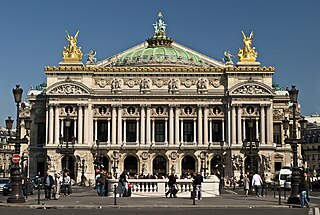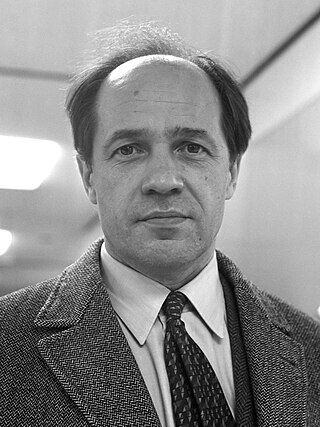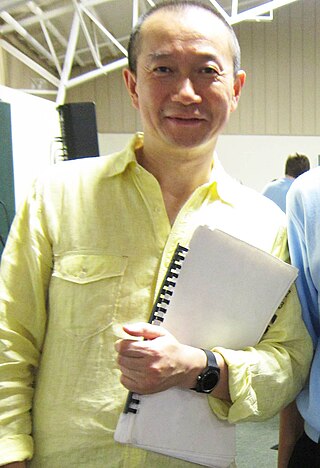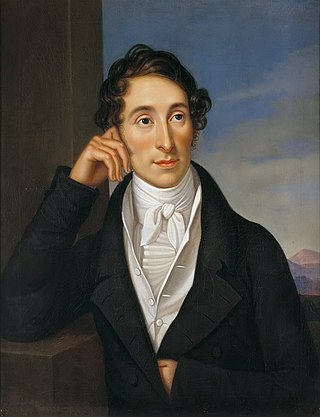Related Research Articles

Henry Purcell was an English composer.

Opera is a form of theatre in which music is a fundamental component and dramatic roles are taken by singers. Such a "work" is typically a collaboration between a composer and a librettist and incorporates a number of the performing arts, such as acting, scenery, costume, and sometimes dance or ballet. The performance is typically given in an opera house, accompanied by an orchestra or smaller musical ensemble, which since the early 19th century has been led by a conductor. Although musical theatre is closely related to opera, the two are considered to be distinct from one another.

Mauricio Raúl Kagel was an Argentine-German composer.

Pierre Louis Joseph Boulez was a French composer, conductor and writer, and the founder of several musical institutions. He was one of the dominant figures of post-war Western classical music.

Sir Harrison Birtwistle was an English composer of contemporary classical music best known for his operas, often based on mythological subjects. Among his many compositions, his better known works include The Triumph of Time (1972) and the operas The Mask of Orpheus (1986), Gawain (1991), and The Minotaur (2008). The last of these was ranked by music critics at The Guardian in 2019 as the third-best piece of the 21st-century. Even his compositions that were not written for the stage often showed a theatrical approach. A performance of his saxophone concerto Panic during the BBC's Last Night of the Proms caused "national notoriety". He received many international awards and honorary degrees.

Tan Dun is a Chinese-born American composer and conductor. A leading figure of contemporary classical music, he draws from a variety of Western and Chinese influences, a dichotomy which has shaped much of his life and music. Having collaborated with leading orchestras around the world, Tan is the recipient of numerous awards, including a Grawemeyer Award for his opera Marco Polo (1996) and both an Academy Award and Grammy Award for his film score in Ang Lee's Crouching Tiger, Hidden Dragon (2000). His oeuvre as a whole includes operas, orchestral, vocal, chamber, solo and film scores, as well as genres that Tan terms "organic music" and "music ritual."

Harry Lawrence Freeman was an American neoromantic opera composer, conductor, impresario and teacher. He was the first African-American to write an opera that was successfully produced. Freeman founded the Freeman School of Music and the Freeman School of Grand Opera, as well as several short-lived opera companies which gave first performances of his own compositions. During his life, he was known as "the black Wagner."

Peter Schmoll und seine Nachbarn is the third opera by Carl Maria von Weber and the first for which the music has survived, though the libretto has not. It was written in 1801–2 when the composer was only 15 and premiered in Augsburg the following year. The libretto is based on a novel by Carl Gottlob Cramer.
James Simon Rolfe is a Canadian composer of contemporary music.

Didon (Dido) is a tragédie lyrique in three acts by the composer Niccolò Piccinni with a French-language libretto by Jean-François Marmontel. The opera is based on the story of Dido and Aeneas from Virgil's Aeneid as well as Metastasio's libretto Didone abbandonata. Didon was first performed at Fontainebleau on 16 October 1783 in the presence of the French sovereigns, Louis XVI and Marie Antoinette. After being remounted at court twice, the opera had its Paris public premiere on 1 December 1783. It proved to be the composer's greatest success and was billed almost every year till 1826, enjoying a total of 250 performances al the Paris Opera. Didon had some influence on Berlioz's opera on the same theme, Les Troyens.
Marco Polo is an opera by the Chinese-born composer Tan Dun set to an English libretto by Paul Griffiths. It premiered in Munich on 7 May 1996. Described variously as an "opera within an opera" and a "fantasia on an epic journey", the multi-layered storyline is loosely based on the journey of Marco Polo from Venice to China. In the opera, Marco Polo becomes two characters: Marco, who represents the real person and is sung by a mezzo-soprano, and Polo who represents his memory and is sung by a tenor. The work is scored for vocal soloists, a chorus of 20 and a large orchestra of both modern and medieval European instruments as well as instruments from the cultures that Marco Polo passed through on his journey, including sitar, pipa, sheng, tabla and Tibetan horns and bells. Marco Polo won the 1998 Grawemeyer Award for Music Composition.

Didone abbandonata was an opera in three acts composed by Tomaso Albinoni. Albinoni's music was set to Pietro Metastasio's libretto, Didone abbandonata, which was in turn based on the story of Dido and Aeneas from the fourth book of Virgil's Aeneid. The opera premiered on 26 December 1724 at the Teatro San Cassiano in Venice and was the first time that an opera based on a Metastasio libretto was performed in Venice.

Dido, Queen of Carthage was an opera in three acts by Stephen Storace. Its English libretto by Prince Hoare was adapted from Metastasio's 1724 libretto, Didone abbandonata, which had been set by many composers. Storace's opera premiered on 23 May 1792 at The King's Theatre in London combined with a performance of his masque, Neptune's Prophecy. The story is based on that of Dido and Aeneas in the fourth book of Virgil's Aeneid. The opera was not a success and was never revived after its original run of performances. The score has been lost.

Didone abbandonata is an opera in three acts composed by Domenico Sarro to a libretto by Pietro Metastasio of the same name which was based on the story of Dido and Aeneas from the fourth book of Virgil's Aeneid. The opera premiered on 1 February 1724 at the Teatro San Bartolomeo in Naples.

The Italian composer Claudio Monteverdi (1567–1643), in addition to a large output of church music and madrigals, wrote prolifically for the stage. His theatrical works were written between 1604 and 1643 and included operas, of which three—L'Orfeo (1607), Il ritorno d'Ulisse in patria (1640) and L'incoronazione di Poppea (1643)—have survived with their music and librettos intact. In the case of the other seven operas, the music has disappeared almost entirely, although some of the librettos exist. The loss of these works, written during a critical period of early opera history, has been much regretted by commentators and musicologists.

Il mondo della luna is an opera in 3 acts by Baldassare Galuppi. The Italian-language libretto was by Carlo Goldoni. It premiered on 29 January 1750 at the Teatro San Moisè, Venice.

Maometto is an opera by Peter von Winter to a libretto by Felice Romani premièred in 1817 at La Scala, Milan. Romani's libretto is unusual in that it depicts Muhammad, the founder of Islam, following the 1736 play Mahomet by Voltaire, and not Mehmed the Conqueror, the Turkish sultan of the fifteenth century known from Rossini's Maometto II.
References
- ↑ "Commonwealth Writers' Prize Regional Winners 1987 – 2007" (PDF). Archived from the original (PDF) on 23 October 2007. Retrieved 6 April 2020.
- ↑ Grimbert (2002) pp. xcvi – xcvii
- ↑ Tonkin (16 January 2009). See also the lengthy extract from the novel and Griffiths's commentary in "From let me tell you" Archived 7 January 2009 at the Wayback Machine , Golden Handcuffs Review, Winter – Spring 2007, Vol. 1, No. 8
- ↑ McLellan (20 November 1995)
- 1 2 Tan Dun quoted in Kerner (11 November 1997)
- ↑ Tommasini (10 December 2007)
- ↑ CBC News (18 January 2007)
- ↑ Alan Rich (30 June 2005)
- ↑ "No. 60728". The London Gazette (Supplement). 31 December 2013. p. 11.